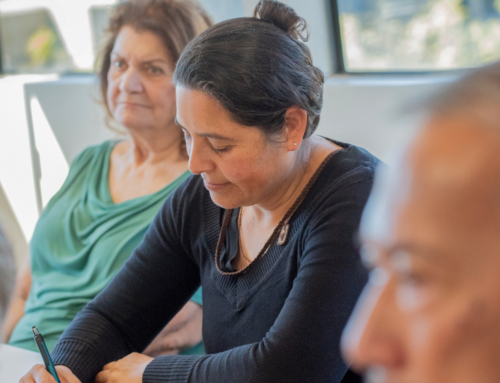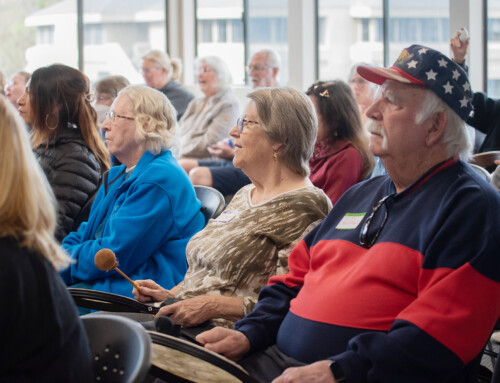If you are caring for someone living with Alzheimer’s disease or another dementia, the challenges of COVID-19 and social distancing may further feelings of isolation. To help, we’ve put together a guide of cognitively stimulating activities you can do virtually or with your person from the safety of home.
Before you start planning, however, it is important to understand these are not one-size-fits-all. In order to pick the right activities for your person, consider their level of cognitive decline, what skills and abilities are remaining, and what cues or environmental aids can help the person. They may not be able to complete some tasks as well as they used to or even have the same tastes or preferences, but stay ready for unexpected opportunities for fun and connection because you never know what will spark their interest.
RELATED | Coronavirus (COVID-19) resources & updates
For someone who is nonverbal, think about ways to talk through the activities described below by using visual and physical cues to connect them to what you’re saying and doing. Consider activities that don’t require a lot of set-up time and that provide immediate feedback. Try to do things together as much as possible – just setting the person down in front of a craft, for example, is not likely to be successful.
Additionally, if you aren’t able to connect with your person physically but are able to reach out through video chat software such as Zoom or Google Hangouts, simply modify the suggested in-person activities to work remotely by sharing your screen with them. Finally, while your person may not remember the moments you are creating – you will! So be kind to yourself and choose things to do that are enjoyable for you both.
Here are some ideas to get you started:
1. Reminisce: Look at old photographs, books, and magazines together. It is a great way to engage, and it can give your person an opportunity to tell stories about times gone by.
2. Engage the 5 senses:
- Sight: There are so many possibilities. Watch a favorite movie, read books, magazines, a short poem, or explore interesting websites on the computer or tablet. Other options include sitting together and observing what’s happening outside the window, going for a drive, drawing doodles, or using coloring books.
- Sound: Listen to a short podcast here. Play music and videos or sing together. Dance if you both can as a way to stay active! Here’s a great video to start. And a list of the 50 best karaoke songs.
- Touch: Have them feel fabrics and familiar objects or have them help you in a meaningful activity like folding warm laundry.
- Taste: Set up a small buffet of chocolate, fruit, or some of their other favorite foods.
- Smell: Have your person smell fresh herbs such as lavender or mint, or even take a moment to enjoy the smells before you dive into your mini-buffet.
3. “Compare and contrast”: One way to do this is to create a fun game around spotting the difference between two images. Something as simple as pulling up a photo of a dog vs. a photo of a cat and have them point out what is the same or different. Another stimulating activity around this idea is to talk about something current (for instance, a TV show or a new model car) and talk through how it has changed over time, and how it might be in the future.
4. Reflect: Start conversations that get the person living with dementia talking and thinking about past accomplishments, achievements, or contributions. This can be sparked by touching an award or other physical prompts around the house.
RELATED | Tips for staying healthy as a dementia caregiver
5. Plan together: Ask for your person’s help with creating a shopping list, gathering supplies, or organizing an upcoming event together. For example: “I think I’ll make some chocolate chip cookies tomorrow. Can you help me make a list of what we’ll need?”
6. Purposeful activity: Find things to do that have a clear purpose, like sweeping, cleaning out a drawer, organizing photos, or weeding the garden. These types of work activities create meaning for the person living with the disease. They show ourselves and others that we are competent and valued members of the family and community, and it can help your person develop a strong feeling of belonging.
- Start a journal. Find time every morning and every evening to write down your intentions for the day, how you felt that day, and one or two things you enjoyed a short entry will do.
- Plant an herb garden.
- Make a family cookbook. Collect recipes in one place.
- Record or write down stories and then share them with your grandchildren or family via email
- Make a gratitude list at the end of each day, review, and add to it every night and then share it with your family via email
7. Laugh: In times like these, laughter can be so valuable. Find ways to do it, whether it’s by watching a funny movie or TV show, reading joke books, or watching YouTube videos.
8. Connect with others: Make phone or video calls to friends and loved ones. Host a virtual tea, coffee time, or happy hour. Take the time to write them a note or card. Chances are, they’re bored at home, too, and will welcome the connection!
- If you’re an older adult living with Alzheimer’s or related dementias who lives alone or knows someone who is, take advantage of our VitALZ program, where volunteers arrange scheduled phone calls to check in on these individuals, ensure they are well, and provide a few minutes of socialization. Click here to learn more.
9. Virtual experiences:
- Visit museums – travel around the world from the comfort of your own home by taking a virtual tour!
- Google’s Arts and Culture team collaborated with 12 famous museums including the Musee d’Orsay to offer this unique experience.
- You can also explore other places like the famous Vatican museum
- Or San Diego’s local U.S.S. Midway Museum.
- Grow a garden through San Diego Master Gardener – they have put together various virtual gardening activities including four specifically for reminiscence gardening.
- Go on “vacation” together…look up places you both want to see or places they might remember. You can even organize a “staycation” and look up local places you both love.
- National Parks through National Geographic Virtual Tours
- The New York Botanical Garden’s Orchid Show
- Explore.com with everything from kitten rescues to Santa Monica sunsets
- For a more unique experience, you can check out Google Earth
- Observe and discuss animals such as sharks and penguins on live cams:
- Bring out their competitive side with online card games or other Facebook games.
- Engage their senses with a multi-player online puzzle from e-puzzle or puzzle world!
- Sing karaoke through Kara Fun or Sing Snap.
- Virtually watch TV and movies together using Netflix Party or Hulu Party.
- Get them moving with Youtube workouts such as yoga or stretching. Here’s a gentle yoga practice video for anxiety. Make sure to only do what feels comfortable for your body. Our Movement & Motion class instructor Dani also put together these videos in our exercise library!
RELATED | Social Activities & Outings
- Take advantage of the Well Connected program for seniors where you can converse with others who share your interests on topics such as poetry, birds, and gardening. They host scheduled activities, support groups, and friendly conversations all completely free through the phone.
- “Attend” an online class together (art, meditation, etc.). Take a class from professors at higher institutions like Yale and Harvard for free through Coursera. Here are some other free meditations to try: Finding Calm in the Storm or Steadying the Heart with the Breath.
- Peruse this huge list of Zoom activity ideas from the team at Passion Planner for more ideas or inspiration.
- Visit the 13 happiest sites on the web including the 100,000 Stars, Recommend me a Book, the Quiet Place Project, etc.
Give us a call to get expert guidance that works for your situation. We’re here to help: 858.492.4400.






